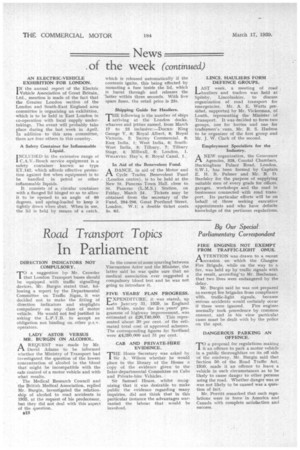Road Transport Topics
Page 36

If you've noticed an error in this article please click here to report it so we can fix it.
In Parliament
By Oar SpecialParliamentaty Correspondent
DIRECTION INDICATORS NOT COMPULSORY.
Ta suggestion byMr. Crowder that London Transport buses should be equipped with traffic signalling devices, Mr. Burgin stated that, following a report by the Departmental Committee on Traffic Signs, it was decided not to make the fitting of direction indicators and stoplights compulsory on any class of motor vehicle. He would not feel justified in asking the L.P.T.B. to accept an obligation not binding on other p.s.v. Operators.
LADY ASTOR VERSUS MR. BURGIN ON ALCOHOL.
A REQUEST was made by Mr. ti David Adams to be informed whether the Ministry of Transport had investigated the question of the lowest concentration of alcohol in the blood that might be incompatible with the safe control of a motor vehicle and with what results.
The Medical Research Council and the British Medical Association, replied Mr. Burgin, investigated the relationship of alcohol to road accidents in 1935, at the request of his predecessor, but they did not deal with this aspect of the question.
131.8 In the course of some sparring between Viscountess Astor and the Minister, the latter said he was quite sure that no medical association ever suggested a compulsory blood test and he was not going to introduce it.
FIVE YEARS' PLAN PROGRESS.
XPENDITURE, it was stated, up LAto Janeary 31, 1939, in England and Wales, under the five years' programme of highway improvement, was estimated at £26,740,000. This represented about 30 per cent, of the .estimated total cost of approved schemes. The corresponding figures for Scotland were £4,390,000 and 31 per cent. •
CAB AND PRIVATE-HIRE EVIDENCE.
THE Home Secretary was asked by Sir A. Wilson whether he would place in the library of the House a copy of the evidence given to the Inter-departmental Committee on Cabs and Private-hire Vehicles.
Sir Samuel. Hoare, whilst recognizing that it was desirable to make public the evidence regarding many inquiries, did not think that in this particular instance the advantages warranted the labour that would be involved. FIRE ENGINES NOT EXEMPT FROM TRAFFIC-LIGHT ONUS.
A TTENTION was drawn to a recent rioccasion on which the Glasgow Fire Brigade, while on the way to a fire, was held up by traffic signals with the result, according to Mr. Buchanan, that two lives were endangered by the delay.
Mr. Burgin said he was not prepared to exempt fire brigades from compliance with traffic-light signals, because serious accidents would certainly occur if these were ignored. Fire engines normally took precedence by common consent, and in his view particular cases must be dealt with by the police on the spot.
DANGEROUS PARKING AN OFFENCE.
TO a proposal for regulations making 1 it an offence to park a motor vehicle in a public thoroughfare on its off side of the roadway, Mr. Burgin said that Section 50 of the Road Traffic Act, 1930, made it an offence to leave a vehicle in such circumstances as to be likely to cause danger to other persons using the road. Whether danger was or was not likely to be caused was a question of fact.
Mr. Porritt remarked that such regulations were in force in America and Canada with complete satisfaction and success.




















































































